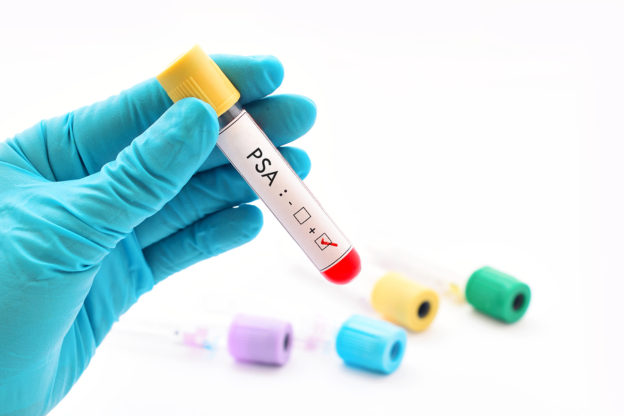By David Blyweiss, M.D., Advanced Natural Wellness
April 5, 2019
Unless I have a male patient who is at high risk of prostate cancer, I don’t recommend PSA testing.
First and foremost, PSA is not a test for prostate cancer. It doesn’t say “Yes, you have it.” It doesn’t say “No, you don’t have it.”
All the test can do is measure levels of prostate-specific antigen a protein made by the prostate gland. And there are any number of non-cancerous reasons you might have high PSA levels.
It could be a sign of an enlarged prostate, inflammation or prostate infection. It might be the result of a medical procedure, weight change, diet or supplements, even recent sexual activity. Or any other external factor that produces unreliable PSA readings.
The truth is, this test is notorious for throwing off false positives that don’t mean a thing. But men get pretty anxious if they see their levels are high. Most of them just can’t seem to walk away from it. Instead, they demand further testing.
And this is the second problem.
MD Exposes the Hidden Danger to Your Eyes

When your eyesight starts to fail, it's a real problem. Suddenly you can't go to the grocery store... you can't get to the doctor if you have an emergency... you can't meet your friends for dinner…
Your "regular" doctor doesn't have time to keep up with the latest research. And the same goes for eye doctors. They go to school to learn how to fit you for glasses and contacts, but have no way of preventing the damage and loss of eyesight that threatens your freedom and independence.
Let me show you something that explains a LOT about how your eyes work.
In my FREE Special Report, I'll show you a HUGE, untapped resource for your eyes that safely and naturally restores clear, effortless eyesight.
Click here to get started...
It leads to biopsies, over-diagnoses and unnecessary treatments that frequently do much more harm than good. (This includes complications such as incontinence and erectile dysfunction.)
Because of these issues, PSA screenings today are only recommended for men who express an interest in them. And believe me. Plenty do, even after I explain all of the associated risks with them.
So I perform the test.
If it comes back with an elevated reading, I cringe. I have to tell the patient.
Often times, the best I can do is try to control their panic and anxiety by recommending measures they can take to help lower PSA and protect against prostate cancer. My four top suggestions include…
Drink pomegranate juice every day. Pomegranate juice is well-known for its power to cut men’s risk of prostate cancer. It reduces PSA production, slows PSA doubling time, and lowers levels of inflammation that put you at risk for prostate cancer. It also stops cancer cells from spreading… and may even help kill them off.
Eat your cruciferous vegetables. These veggies are another powerful weapon against prostate cancer. They include arugula, bok choy, broccoli, Brussels sprouts, cabbage, cauliflower, collard greens, kale, mustard greens, radishes, rutabaga, turnips and watercress. Just three or more servings a week can shrink your risk of prostate cancer by about 41%.
Enjoy more lycopene-rich tomatoes. These red fruits are great cancer fighters! They are abundant in lycopene, a powerful antioxidant that can slash the risk of prostate cancer by about a third. The lycopene found in tomatoes is also associated with lower PSA levels.
Oddly enough, the lycopene in canned tomatoes is much more absorbable than that in the fresh fruit. Go for an organic brand that has a low salt content…or supplement with 6.5 mg of lycopene daily.
The World's Quickest Solution for Ending Prostate and Urinary Misery
This has recently been revealed to be one of the only real breakthroughs in prostate health.
The seeds of a strange fruit (sometimes called "Chinese Apples") hold powerful phytonutrients that are a revolution in prostate health.
In fact, UCLA and Veterans Administration research have now proved this to be true.
Not only that, but it may be the worlds quickest solution for ending prostate misery.
Simply stated, these phytonutrients represent a huge step beyond beta sitosterol, saw palmetto, and other phytosterols alone.
Simply click HERE if you want to have fast prostate relief...restful, uninterrupted sleep...no more constant "urges to go"...enhanced virility...and optimal prostate support for life.
Don’t forget your healthy fats. The fats found in olive oil, nuts and wild-caught seafood offer protection against cancer and support a healthy prostate.
As patients adopt these healthy nutritional strategies and increase their physical activity, I monitor their PSA frequently over the next 4-6 months.
In a large number of cases PSA levels show a steady decline. But not always.
Here is what I recommend
when PSA Continues to Rise
Every now and then PSA continues to rise despite lifestyle changes. In these cases, I recommend a Multiparametric MRI (mpMRI) before havin
But what happens if you get a cancer diagnosis after the biopsy?
Keep in mind that, in most cases, prostate cancer cells grow so slowly that they never pose a serious risk to health or longevity. (Remember: More men actually die with prostate cancer than because of it.)
This makes active surveillance a sensible alternative to taking drastic action that could leave you feeling like a eunuch.
So before making a decision, go over all of the pros and cons with your doctor.
If you need a little help, I discovered a handy-dandy tool that pretty accurately pools the risk of various outcomes depending upon what type of action you take.
Not only will it show your predicted survival rate if you do nothing. It also shows your risk of erectile dysfunction, incontinence and bowel issues associated with different courses of treatment.
While it can’t make the decision for you, it can certainly help guide you during discussions with your physician. And it can improve the chances that you will make the choice that is best for you.
SOURCES:
Pantuck AJ, et al. Phase II study of pomegranate juice for men with rising prostate-specific antigen following surgery or radiation for prostate cancer. Clin Cancer Res. 2006 Jul 1;12(13):4018-26.
Wang L, et al. Pomegranate and its components as alternative treatment for prostate cancer. Int J Mol Sci. 2014 Aug 25;15(9):14949-66.
Cohen JH, et al. Fruit and vegetable intakes and prostate cancer risk. J Natl Cancer Inst. 2000 Jan 5;92(1):61-8.
Fraser ML, et al. Lycopene and prostate cancer: emerging evidence.Expert Rev Anticancer Ther. 2005 Oct;5(5):847-54.
Capurso C, et al. The Mediterranean Diet Reduces the Risk and Mortality of the Prostate Cancer: A Narrative Review. Front Nutr. 2017; 4: 38.
Wallis CJD, et al. Role of mpMRI of the prostate in screening for prostate cancer. Transl Androl Urol. 2017 Jun; 6(3): 464–471.






